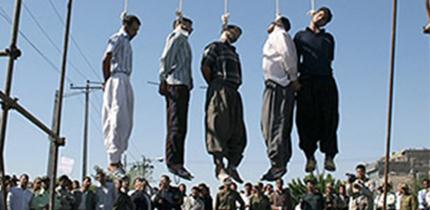Iran’s government executed at least 82 people in the weeks after Hassan Rouhani was elected as president in June, according to a United Nations investigator.
Ahmed Shaheed, the UN special rapporteur on human rights in Iran, said in a reportpresented to the General Assembly yesterday that he’s “alarmed by the spate of executions,” 38 of which were officially announced during the same period that “at least 44 others reportedly took place.”
Rouhani, who took office Aug. 4, has pardoned political prisoners in a bid to promote a thaw with global powers over the Islamic republic’s disputed nuclear program. International talks on the country’s nuclear initiatives were held last week in Geneva, as Rouhani’s government seeks relief from sanctions that have battered its economy.
While Shaheed acknowledged the Rouhani administration’s recent overtures “designed to reduce tensions” and “reset” international sanctions, and welcomed the release of female rights activist Nasrin Sotoudeh, he told the General Assembly in a separate address yesterday that he hasn’t seen signs of fundamental improvements to Iran’s human rights situation.
The Iranian mission to the UN criticized Shaheed’s report and comments as a “non-objective and counter-productive exercise initiated by a group of countries with specific political claim against Iran,” according to remarks prepared for yesterday’s General Assembly meeting on the report.
Obama Call
Rouhani freed dozens of political prisoners and student activists days before his attendance at the annual September meeting of world leaders at the UN headquarters inNew York. His outreach during the week-long event led to a phone call on Sept. 27 with U.S. President Barack Obama, a break in more than three decades of silence between leaders of the two countries.
About 724 executions took place between January 2012 and June 2013 and at least 500 human rights defenders remain behind bars, according to Shaheed’s report. About 600 journalists are defined as operatives of an “anti-state” network, and women still experience discrimination, with all 30 registered female candidates seeking to run against Rouhani in the June election getting disqualified, he said in the report.
Iran is calling on the U.S. and European Union to ease sanctions that have led to a drop in exports and a slide in its currency’s value. The U.S. and other Western powers are demanding curbs on Iran’s nuclear work, which they say may be a cover for a weapons program. Iran says it has a right to enrich uranium and is interested only in using nuclear technology for peaceful, civilian purposes.
Shaheed, who wasn’t allowed to enter Iran to conduct his inquiry, cited press reports that financial-sector sanctions against Iran were blocking delivery of food, medical supplies and medicines. He urged Iran’s government to let him visit the country to more accurately probe the state of human rights.


Leave a Reply
You must be logged in to post a comment.